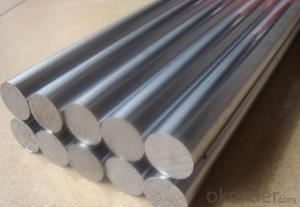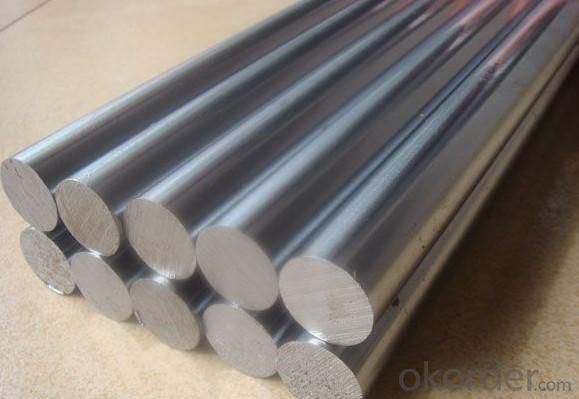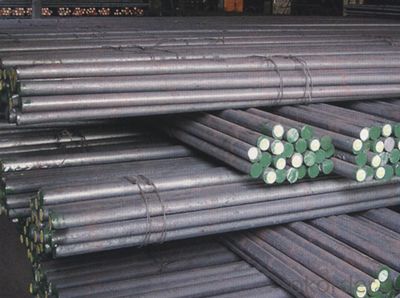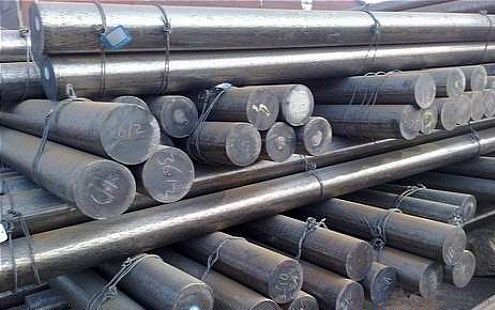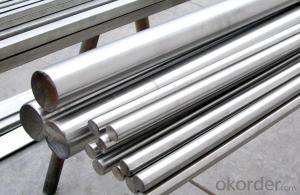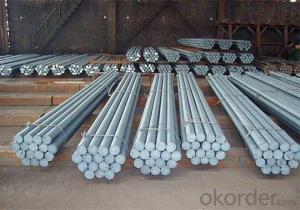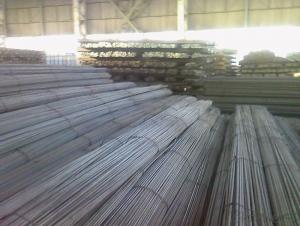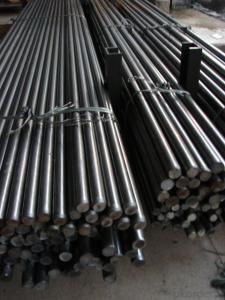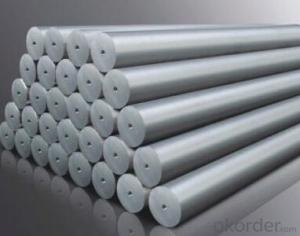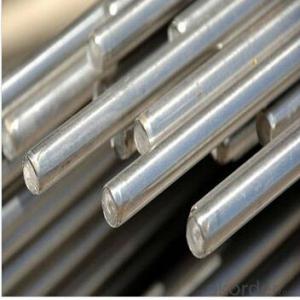Forged Spring Steel Round Bar with the Size 30mm
- Loading Port:
- Shanghai
- Payment Terms:
- TT or LC
- Min Order Qty:
- 20 m.t.
- Supply Capability:
- 500 m.t./month
OKorder Service Pledge
OKorder Financial Service
You Might Also Like
Product Description:
OKorder is offering Forged Spring Steel Round Bar with the Size 30mm at great prices with worldwide shipping. Our supplier is a world-class manufacturer of steel, with our products utilized the world over. OKorder annually supplies products to European, North American and Asian markets. We provide quotations within 24 hours of receiving an inquiry and guarantee competitive prices.
Product Applications:
Forged Spring Steel Round Bar with the Size 30mm is widely used to make the bearing used in automobile, tractor engine, transmission and the wheel. And it also used to make the main bearing for the machine tools, electrical machinery, mining machinery, electric locomotives,mechanical ventilation and high speed of grinding wheel spindle etc
Product Advantages:
OKorder's Forged Spring Steel Round Bar with the Size 30mm with High Quality are durable, diversified and qualified.
Main Product Features:
· Premium quality
· Prompt delivery & seaworthy packing (30 days after receiving deposit)
· Can be recycled and reused
· Mill test certification
· Professional Service
· Competitive pricing
Product Specifications:
Manufacture: Hot rolled
Grade: 20CrNiMoA 20CrNi2MoA 16Cr2Ni4MoA 12Cr2Ni3Mo5A 20Cr2Ni4A 20Cr2Ni2MoA
Cr4Mo4V Cr15Mo4 W9Cr4V2Mo W18Cr4V W6Mo5Cr4V2 5CrMnMo 60CrMnMoNi 37CrA 55SiMoVA etc
Certificates: ISO, SGS, BV, CIQ
Length:6m 8m 9m 12m
Packaging: Packed in bundles with standard export sea-worthy package or as customer require
FAQ:
Q1: Why buy Materials & Equipment from OKorder.com?
A1: All products offered byOKorder.com are carefully selected from China's most reliable manufacturing enterprises. Through its ISO certifications, OKorder.com adheres to the highest standards and a commitment to supply chain safety and customer satisfaction.
Q2: How do we guarantee the quality of our products?
A2: We have established an advanced quality management system which conducts strict quality tests at every step, from raw materials to the final product. At the same time, we provide extensive follow-up service assurances as required.
Q3: How soon can we receive the product after purchase?
A3: Within three days of placing an order, we will begin production. The specific shipping date is dependent upon international and government factors, but is typically 7 to 10 workdays.
Q4: How many types of bearing steel that OKorder.com can supply?
A4: Two types, carbon spring steel and alloy spring steel
Images:
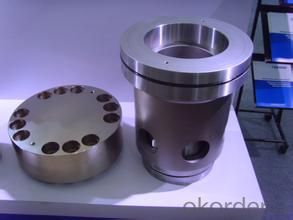
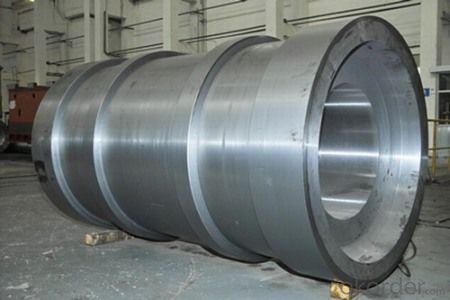
- Q: How does special steel contribute to the impact resistance of products?
- Special steel contributes to the impact resistance of products by providing superior strength, toughness, and durability. Its unique composition and manufacturing processes enhance its ability to withstand high impact forces without deforming or breaking. This makes it a valuable material for applications where products need to withstand heavy loads, vibrations, or collisions, ensuring their longevity and reliability.
- Q: How does stainless steel contribute to the production of medical implants?
- Stainless steel contributes to the production of medical implants by providing a highly durable and corrosion-resistant material that is compatible with the human body. It is used in various implants such as joint replacements, dental implants, and surgical instruments due to its strength, biocompatibility, and ability to withstand sterilization processes.
- Q: What are the applications of special steel in the railway industry?
- Special steel has various applications in the railway industry, primarily due to its exceptional strength, durability, and resistance to extreme conditions. It is commonly used in the manufacturing of railway tracks, ensuring their longevity and ability to withstand heavy loads and frequent train traffic. Special steel is also employed in the production of railway wheels and axles, providing enhanced wear resistance and improved performance. Additionally, it is utilized in the construction of railway bridges and tunnels, where its high tensile strength and corrosion resistance are crucial for maintaining structural integrity and safety.
- Q: What are the specific requirements for special steel used in the textile machinery industry?
- The specific requirements for special steel used in the textile machinery industry include high strength and durability to withstand the high-speed operations and repetitive movements of the machinery. The steel should also possess excellent wear resistance to prevent premature wear and tear. Additionally, it should have good corrosion resistance to withstand exposure to moisture and chemicals commonly found in textile processing. Lastly, the steel should exhibit good heat resistance to maintain its structural integrity even under high temperatures generated during the production process.
- Q: How is high-speed stainless steel used in the production of machining tools?
- High-speed stainless steel is often used in the production of machining tools due to its excellent combination of strength, hardness, and corrosion resistance. It allows for higher cutting speeds and longer tool life, resulting in improved productivity and cost-efficiency. Additionally, the stainless steel's resistance to heat and wear makes it suitable for high-temperature applications, ensuring the durability and reliability of the machining tools.
- Q: How does special steel perform in forging applications?
- Special steel is highly desirable for forging applications due to its exceptional strength, durability, and resistance to wear and tear. It offers superior performance as it can withstand the intense heat and pressure involved in the forging process without losing its shape or integrity. Additionally, special steel's unique composition allows for precise shaping and intricate designs, making it an ideal choice for complex forging projects.
- Q: What are the main applications of special steel in the packaging machinery?
- Special steel is widely used in packaging machinery due to its outstanding properties such as high strength, corrosion resistance, and durability. It is primarily utilized in the construction of machine components like blades, dies, and molds, ensuring efficient and precise cutting, shaping, and forming of packaging materials. Additionally, special steel's ability to withstand high temperatures and extreme pressures make it suitable for applications requiring heat sealing or sterilization of packaging. Overall, special steel plays a crucial role in enhancing the performance, reliability, and longevity of packaging machinery.
- Q: How does special steel perform in extreme pressure conditions?
- Special steel offers exceptional performance in conditions of extreme pressure, thanks to its unique composition and manufacturing process. It possesses high strength, durability, and resistance to deformation, which make it ideal for applications involving extreme pressures. Under extreme pressure, special steel maintains its structural integrity without significant deformations. This is possible due to its impressive tensile strength, allowing it to withstand tremendous forces without breaking or bending. Furthermore, the hardness and toughness of special steel enable it to resist wear and damage caused by intense pressure. In addition, special steel exhibits excellent heat resistance, which is vital in extreme pressure situations where elevated temperatures are common. Its ability to withstand high temperatures without compromising its mechanical properties ensures its dependability and effectiveness even in the most demanding circumstances. Moreover, the corrosion resistance properties of special steel are outstanding, making it suitable for use in extreme pressure environments where exposure to corrosive substances is a concern. Its resistance to oxidation and other chemical reactions prevents deterioration or weakening, guaranteeing long-term performance and reliability. Overall, special steel excels in extreme pressure conditions due to its high strength, durability, resistance to deformation, heat resistance, and corrosion resistance. These characteristics make it a reliable and efficient choice for various industries and applications that operate in extreme pressure environments, including oil and gas exploration, aerospace, automotive, and heavy machinery manufacturing.
- Q: What are the different surface finishing techniques for special steel?
- Some of the different surface finishing techniques for special steel include electroplating, powder coating, passivation, etching, and polishing.
- Q: How long does special steel typically last in various applications?
- The lifespan of special steel can vary in different applications due to various factors. Special steel is renowned for its remarkable strength, durability, and resistance to corrosion, making it suitable for a wide array of applications. However, the actual lifespan of special steel relies on the specific application, maintenance practices, and environmental conditions it encounters. In general, special steel can endure for several decades, or even longer, when utilized in industries like construction, automotive, aerospace, and manufacturing. For example, in building structures, special steel can remain intact for 50 to 100 years due to its robustness and ability to withstand extreme loads and weather conditions. In automotive applications, special steel components such as engine parts, suspension systems, and body frames can have a lifespan of 15 to 30 years, provided they are well-maintained and not subjected to excessive wear and tear. In the aerospace industry, special steel is commonly utilized in crucial components like turbine blades, landing gears, and fuselage structures. These parts undergo rigorous testing and inspection procedures and are designed to last for decades, typically around 30 to 50 years, before necessitating replacement or refurbishment. In manufacturing processes, special steel tools and dies can last anywhere from a few years to several decades, depending on factors such as the intensity of use, the material being processed, and the maintenance practices employed. Proper lubrication, cooling, and regular maintenance can significantly prolong the lifespan of these tools. It is important to note that the lifespan of special steel can be negatively impacted by factors such as exposure to harsh chemicals, high temperatures, aggressive environments, or inadequate maintenance. Consequently, regular inspections, maintenance, and adherence to recommended usage guidelines are crucial in ensuring the longevity of special steel in various applications.
Send your message to us
Forged Spring Steel Round Bar with the Size 30mm
- Loading Port:
- Shanghai
- Payment Terms:
- TT or LC
- Min Order Qty:
- 20 m.t.
- Supply Capability:
- 500 m.t./month
OKorder Service Pledge
OKorder Financial Service
Similar products
Hot products
Hot Searches
Related keywords
